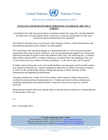Click to expand Image
Vanessa Nakate, of Uganda, center, takes part in a protest against fossil fuels at the COP28 U.N. Climate Summit in Dubai, United Arab Emirates, December 5, 2023.
© 2023 Rafiq Maqboo/AP Photo
After one week of climate change negotiations at COP28 in Dubai, there is still no agreement on the most consequential issue on this year’s agenda: the human rights imperative to phase out fossil fuels.
In the lead up to COP28, more than 80 countries had supported the call to phase out all fossil fuels. But the current draft of the Global Stocktake, the conference’s official report on the current state of climate science and policy responses, is long and vague, with a single robust reference to the need for a “just phase out [of] fossil fuels,” proposed as one possible option among three.
Read a text description of this video
TIME IS TICKING.
80+ countries pledged to ditch fossil fuels at COP28
One week into negotiations, any real progress?
NOT ENOUGH
GOVERNMENTS, MAKE THE COMMITMENT.
PHASE OUT FOSSIL FUELS
UPHOLD HUMAN RIGHTS
Governments have long sided with the fossil fuel industry, which is one of the main culprits of the global climate breakdown, despite the urgent need to confront the climate crisis and protect human rights. The United Arab Emirates (UAE), which is hosting COP28, is a prime example.
A new investigation and documentary by the BBC shows that even though the UAE formally banned flaring, the burning of waste gas during oil and gas drilling, the practice continues at offshore sites, contributing to air pollution and harmful methane greenhouse gas emissions. Human Rights Watch recently documented toxic air pollution from the fossil fuel industry in the UAE, substantially contributing to the country’s burden of preventable death and disease.
Fossil fuels are the primary driver of the climate crisis and can be linked to severe human rights harms. The International Energy Agency agrees that there cannot be any new fossil fuel projects if countries are to meet existing climate targets and for the planet to avoid the worst consequences for frontline communities. But governments have largely failed to act, which will have devastating consequences for the planet and human health.
Worldwide, routine gas flaring and venting pose severe health hazards, from cancer to respiratory health. Air pollution from oil refineries and coal plants results in hundreds of thousands of premature deaths globally. Open-cut coal mining contaminates drinking water for entire communities.
Governments need to protect those most immediately and directly harmed by fossil fuels. And governments need to heed the scientific consensus and not launch any new oil, gas, or coal projects.
Over the next week, governments at COP28 have an opportunity to uphold rights and finally commit to a fair, fast, full, and funded phase out of all fossil fuels.




